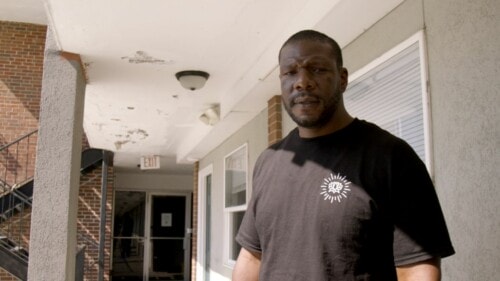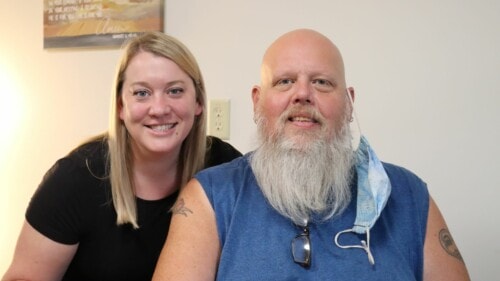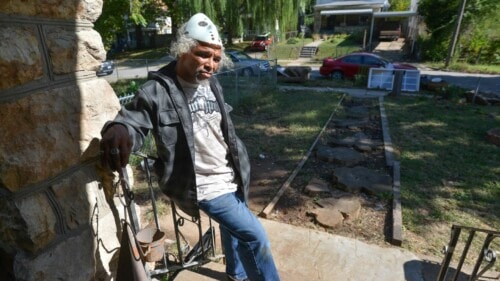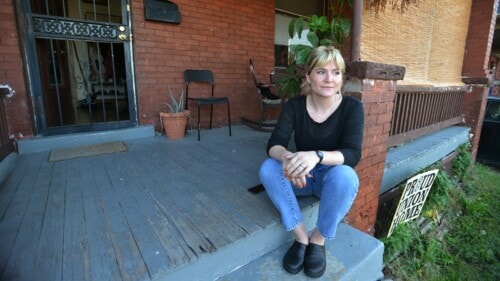Vacant Lots, Absentee Owners, Little Accountability. What’s Going on With the Kansas City Land Bank? The Kansas City Land Bank is supposed to revitalize neighborhoods. But a Beacon investigation found that the Land Bank has potential conflicts of interest between board members and buyers, and fails to hold buyers accountable to its own requirements. The result: Properties sit vacant for years.
Published October 22nd, 2021 at 6:00 AM
Above image credit: These vacant lots were purchased from Kansas City's Land Bank by Joshua Bowlin in 2017. Since then, the lots have accumulated trash and overgrown weeds. (Photo Illustration: Chase Castor | The Beacon)Towering weeds. Disposed needles. Piles of trash.
This is the state of the empty lots owned by Joshua Bowlin, who was approved to purchase 43 vacant lots from the Kansas City, Missouri, Land Bank in 2017 through his LLC, DC Capital and Investments.
The goal of the Land Bank is to create more homes and community spaces by selling vacant, tax-delinquent properties to buyers — sometimes for only $1.
But through a series of record requests, court documents and interviews, The Beacon found the Kansas City Land Bank has potential conflicts of interest between board members and buyers, and fails to hold buyers accountable to its own requirements. As a result, a program meant to revitalize neighborhoods across the city leaves dozens of lots vacant for years.
Lots owned by Bowlin, clustered in Kansas City’s Historic Northeast, are mostly east of Bellefontaine Avenue, stretching north to south from Independence Avenue to Saint John Avenue. They’ve sat vacant for years — racking up city code violations, according to an analysis of 311 records — despite explicit Land Bank requirements that owners build on lots within 180 days.
Bowlin hasn’t filed for any construction or building permits to reach that end goal, The Beacon found by analyzing permits issued for the properties. Despite multiple attempts, The Beacon was unable to contact Bowlin.
Bowlin’s real estate interests stretch beyond purchasing Land Bank properties. Court documents and public records also unveiled a professional relationship between Bowlin’s LLC, properties owned by Bowlin’s business and Kansas City attorney Julie Anderson, the current chair of Kansas City’s Land Bank. Anderson declined multiple interview requests.
The Beacon also reached out to the other Land Bank commissioners and Executive Director Tracey Bryant, who also declined requests for comment.
Kansas City Land Bank Intended as Route for Homeownership
Missouri state legislation in 2012 established the Land Bank of Kansas City, Missouri, as a governmental entity. Its purpose: to acquire tax delinquent properties in Kansas City, Missouri, and sell them at a discounted rate to those who commit to renovating the properties.
There are currently more than 2,700 Land Bank properties — from vacant residential homes to vacant lots — for sale. The Land Bank markets its properties at rates lower than the private housing market.
From there, the Land Bank advertises the property for sale and evaluates offers from interested parties. Buyers must prove they have the financial security necessary to repair the property as promised.
They can be purchased by a nonprofit or an individual buyer through an LLC, as Bowlin did, if they fill out the appropriate forms and enter into a deed of trust that includes a renovation plan for the tax-delinquent property.
An analysis of all Land Bank properties purchased since 2013 showed Bowlin was the most frequent private buyer — second only to the Homesteading Authority of Kansas City, a local nonprofit that maintains a relationship with the Land Bank.
Tax-delinquent Properties Offer Cheap Kansas City Real Estate
Neighbors of the vacant lots owned by Bowlin are getting fed up with his absence as they deal with the repercussions of living next to vacant, overgrown lots. City inspectors have left notice after notice of code violations at the properties.
Land Bank records show Bowlin bought each of his 43 properties from the Land Bank for $75 each — for a total of $3,225.
When people buy Land Bank properties, they sign an agreement to build on vacant lots, renovate or repair buildings on the property within 180 days. This is legally assured through a deed of trust, which states the Land Bank can repossess a property if the agreement isn’t upheld.
A recent investigation by The Beacon found that the Land Bank also owns several properties with buildings classified as “dangerous” by the city, though these properties are not currently listed in the Land Bank’s inventory and the Land Bank itself isn’t required to make improvements to properties it owns.
Combined, Bowlin’s vacant properties would have a total estimated value of $1,822,100 once development was completed and the deeds of trust were released, according to Land Bank data. None have been released from their deeds of trust since their initial purchase in 2017.

More than half of Bowlin’s properties have had at least one property violation, according to a Beacon analysis of 311 calls and inspections, since he purchased them. Many of these violations resulted in a summons to municipal housing court — data from the municipal court shows there have been 70 cases opened against Bowlin for code violations since late 2017. Out of those cases, 30 are still active, and another 37 have warrants for failure to appear in court. One of the properties, 409 Askew, was demolished and returned to Land Bank possession after being designated as a dangerous building.
Monte Roden lives next to one of Bowlin’s properties at 439 Myrtle Ave. in Kansas City’s Historic Northeast area. Roden said the lot was once the home of a beautiful stone house that was torn down about 10 years ago.
311 records indicate that since Bowlin bought the property, there have been public reports of people using drugs on the overgrown lot.
“I’m on the verge of calling the city,” Roden said.
He hasn’t called yet because every fall someone comes and cleans up the lot, taking bags of trash and debris with them.
Lawsuits Pile up for Alleged Real Estate Fraud
Court records, family members and attorneys indicate Bowlin was living in Scottsdale, Arizona, earlier this year, but lawyers hoping to confront him in court have been unable to find him.
The Land Bank website states it will never sell to property owners in Kansas City with delinquent taxes or code violations, and that its policies and procedures are designed to “prevent speculators from purchasing properties with the sole intention of ‘flipping’ them for a quick profit.
“Our applicants are thoroughly screened to ensure that they are willing and able to comply with our policies and procedures and that their plans are in the best interest of the community,” the Land Bank’s website states.
“That is our commitment to you.”

The Beacon conducted a search through Casenet, an online statewide court record system, for DC Capital and Investments. It found that the LLC, and in some cases Bowlin personally, is facing four lawsuits alleging real estate fraud. Beacon reporters obtained case documents for the lawsuits through the Jackson County Courthouse.
Robert Bowlin agreed to work with his nephew, Joshua Bowlin, to rehabilitate several units of a condominium named La Hacienda, at 4063 Warwick Blvd. in Westport, and resell it to split the profits, according to a 2019 lawsuit petition. The units were owned by Joshua Bowlin, and the repair and sale agreement was made through their LLCs, DC Capital and Investment and Broadband Design. Three years after Joshua Bowlin sold the property, and after Robert had poured over $100,000 into the rehabilitation effort, those profits have never materialized.
Robert Bowlin told The Beacon that when he came to Kansas City from Colorado to help his nephew rehabilitate the property, he was under the impression that they’d be working on it together. Instead, Robert said, Joshua said he was too busy and pushed all of the work onto his uncle.
“I didn’t put a lien on it or anything, like I usually would, because I didn’t think I’d need one against my own nephew,” he said.
Court records allege Joshua Bowlin sold the renovated condominium for a net profit of $286,436, half of which was supposed to go to Robert Bowlin, but didn’t. Robert Bowlin sued for breach of contract, unjust enrichment and fraud, prompting a years-long legal battle that ended with a default judgement in favor of the uncle. The default judgment came after Joshua Bowlin’ attorney withdrew as his counsel.
“Nobody should trust him,” Robert Bowlin said. “I would love to see the guy go to jail.”
Allegations of fraud weren’t confined to Joshua’s immediate family.
A petition filed in 2019 for breach of contract, fraudulent misrepresentations, negligent misrepresentation and piercing the corporate veil said that over a period of two years, DC Capital and Investments was loaned $820,000 from Lynn Miller and SAMM Investments, with the understanding Bowlin would pay them back with interest once he sold other rehabilitated properties in Kansas City. Bowlin never sold the properties, despite multiple promises to Miller through email, according to court records.
A judge ordered Bowlin’s LLC to pay $320,000 plus interest accrued on the loans.
Another default judgement was leveled against Bowlin and his LLC in September, after he failed to appear in court proceedings for a suit that alleged breach of contract, unjust enrichment, fraudulent misrepresentation, negligence, fraudulent nondisclosure and violation of the Missouri Merchandising Practices Act. In that case, Bowlin was accused of trying to sell six condominium units to a buyer when he only owned five of them. The judge ordered Bowlin and his associates to pay $152,233.75, but lawyers for the buyer told The Beacon they have been unable to locate him.
Nobody should trust him.
ROBERT BOWLIN, UNCLE TO JOSHUA BOWLIN
An ongoing lawsuit, for breach of covenant of good faith, fraud, negligent misrepresentation, fraud by silence and promissory estoppel, against Bowlin and his LLC filed in 2019 by an Arizona-based company alleges Bowlin intentionally misled the Arizona buyers in purchasing a property he owned in Kansas City.
The lawsuit states that Bowlin promised to make renovations and find tenants for the property in exchange for selling it for the Arizona company — the lawsuit alleges that those promises were never fulfilled, and that Bowlin misrepresented the state of the property and extent of necessary repairs. A judgement has not yet been issued.
Bowlin’s Connection to Kansas City Land Bank Chair
Three of the Land Bank commissioners are appointed to their positions; Kansas City Public Schools, Jackson County, and the Kansas City mayor each have a pick. Attorney Julie Anderson has been on the board since 2016, when former mayor Sly James appointed her. As chair of the board of commissioners, Anderson is involved with the approval of land transfers to prospective buyers, per the Land Bank’s policy.
Anderson is a well-known attorney in Kansas City, particularly when it comes to eviction proceedings. Her law firm, Anderson & Associates, said on its website that it is “one of the largest filers of residential and commercial eviction cases in the Kansas City metropolitan area.”
As a board member, Anderson is required to fill out a conflicts of interest form with the City Clerk’s office. Conflicts of interest forms Anderson completed for fiscal years 2017 and 2021 state she did not have any conflicts of interest to disclose.
A search on Casenet revealed that in 2017 — the same year Bowlin was approved to purchase 43 vacant lots from the Land Bank — and 2018, Anderson represented his LLC, DC Capital and Investments, in court 11 times on eviction proceedings for other properties he owned or managed in Kansas City.
The first case she represented him in was filed in 2017, shortly after he bought the Land Bank properties.
Land banks in the area have faced conflict of interest violations before. In 2000, state auditor Claire McCaskill released an audit of the Land Trust of Jackson County that found multiple issues, including selling two properties to a Land Trust employee’s spouse without undergoing the normal review process.
“I don’t know the answer,” said City Auditor Douglas Jones when asked whether or not Anderson’s connection to Bowlin would constitute a conflict of interest.
“But that is the type of question that can be submitted to the ethics committee. Sometimes it might be something that doesn’t look good, but it’s not part of the ethics code that they have responsibility over.”
Emily Wolf covers local government and Celisa Calacal covers economics and civic engagement for The Beacon, a member of the KC Media Collective.










